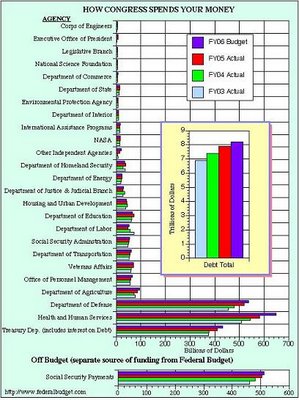 For Immediate Release
For Immediate ReleaseOffice of the Press Secretary
October 11, 2006
President Bush Discusses the Economy and Budget
2:10 P.M. EDT
THE PRESIDENT: Thank you all. Please be seated. Good afternoon. Thanks for coming to the White House.
In 2004, I made a promise to the American people, we would cut the federal budget deficit in half over five years. Today I'm pleased to report that we have achieved this goal, and we've done it three years ahead of schedule. (Applause.)
This morning my administration released the budget numbers for fiscal 2006. These budget numbers are not just estimates; these are the actual results for the fiscal year that ended February the 30th.* [sic] These numbers show that the budget deficit has been reduced to $248 billion and is down to just 1.9 percent of the economy. As a percentage of the economy, the deficit is now lower than it has been for 18 out of the last 25 years. These budget numbers are proof that pro-growth economic policies work. By restraining spending in Washington, and allowing Americans to keep more of what they earn, we're creating jobs, reducing the deficit, and making this nation prosperous for all our citizens.
**********************************
"Budget Deficit" vs. "National Debt" ---
Suppose you want to spend more money this month than your income. This situation is called a "budget deficit". So you borrow. The amount you borrowed (and now owe) is called your debt. You have to pay interest on your debt. If next month you don't have enough money to cover your spending (another deficit), you must borrow some more, and you'll still have to pay the interest on the loan. If you have a deficit every month, you keep borrowing and your debt grows. Soon the interest payment on your loan is bigger than any other item in your budget. Eventually, all you can do is pay the interest payment, and you don't have any money left over for anything else. This situation is known as bankruptcy.
Each year since 1969, Congress has spent more money than its income. The Treasury Department has to borrow money to meet Congress's appropriations. The total borrowed is more than $8,000,000,000,000 and growing. Even when government officials claim to have a surplus, they still spend more than they get in. We pay interest on that huge debt.
The National Debt is $8.5 Trillion!
Updated 9 October 2006.
Check the debt yourself at the U. S. Treasury Department web site, it changes daily

No comments:
Post a Comment